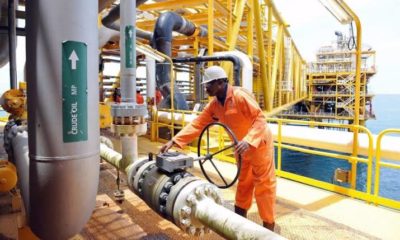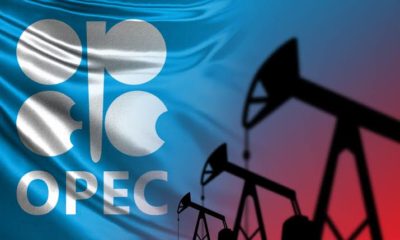Oil
Oil and gas companies should redirect their focus while OPEC policies play out

By Drake LAWHEAD
LAGOS-HEADING into 2016, oil and gas pundits are finding little to cheer as fears of a ‘super-glut’ of global supply combined with decelerating demand begin to become apparent. As the new Government takes steps to clean up some of the governance issues that have created structural inefficiencies and lost money, companies are faced with finding new solutions to ensuring survival in a potentially prolonged low-oil-price paradigm.
Saudi Arabia, to the growing dismay of even its Gulf allies and other OPEC members, has now ramped up production to its highest in 30 years with no indication it plans to change course in order to stabilize the price of oil.
At the same time, the lifting of sanctions on Iran figures to introduce more oil and gas onto global markets, and the supposed collapse in shale and tight oil production in the USA has failed to materialize. What nearly every industry watcher failed to anticipate entirely was just how resilient the constellation of US producers have been in the face of unprofitably low oil prices.
So who is Saudi Arabia’s policy of increasing production to create a glut benefitting? The cracks in OPEC are emerging, not just between the Gulf state allies and the likes of Venezuela, Ecuador, or Nigeria, but between the Gulf States themselves. At a recent conference, Mohammed Bin Hamad Al Rumhy, Oman’s Minister of Oil accused Saudi Arabia of creating a man-made problem which everyone else is suffering from.
Behind the strategy was an assumption that Saudi Arabia could survive longer on low oil prices than the US shale industry could – and once the latter started going out of business, Saudi Oil would swoop in with increased market share as prices began to rise again. It’s an assumption that now looks mistaken. As Drake Lawhead, Managing Director of the Oil and Gas Council
“The US shale industry, unlike Saudi Arabia’s, is not centrally controlled by any single entity, rather, it is the sum of hundreds and hundreds of producers, large and small, thousands of service companies, tens of thousands of engineers and entrepreneurs solving problems every day, and hundreds of thousands of financiers and investors creating a liquid market that efficiently distributes capital to where it is will be profitable, and the whole thing is possible because the right regulatory framework and transparent fiscal incentives are in place to allow an efficient and diverse market to flourish.”
US shale story contains lessons for survival for Nigeria
There is a lesson for Nigeria there. “Nigeria is fortunate in one sense, which is that its average onshore production costs can be as low as $20 per barrel, and offshore around $30-40. The average marginal cost per barrel of shale in the USA is around $70, which means many of the struggles Nigeria will encounter in producing oil in a low-price environment are above ground – related to the efficiency not just of Government agencies, but of companies themselves”.
US shale companies have shown a resilience that has surprised industry-watchers, finding savings and efficiencies that many (including, presumably, Saudi Arabia) considered not possible.
“There is nothing a Nigerian oil company can do about the price of oil and little they can do about the machinations of Government policy over the sector, so they must focus on finding internal structural efficiencies, but also, the sector and all its entrepreneurs need to collaborate to find synergies, invest in new technologies, and find long-term sources of capital and financial backers who will sit with them to solve the problem.” Lawhead added.
The West Africa Energy Assembly, run by the Oil & Gas Council takes place in Lagos on December 1-2 and is designed as a forum to help Nigerian companies find these synergies, discuss appropriate Government regulatory policy, meet investors and make themselves attractive targets of capital. It is open to senior executives in Nigeria’s Oil and Gas sector and details on registering are on their website: www.oilcouncil.com
Drake Lawhead is Managing Director, Africa
for Oil & Gas Council
Oil
NNPC Targets 60% Methane Emission Reduction By 2031
The Nigerian National Petroleum Company Limited (NNPC) has unveiled a bold strategy to reduce methane emissions in the oil and gas sector by 60% by 2031, with an ultimate goal of achieving net-zero emissions by 2060.
This announcement reinforces Nigeria’s leadership role under the Global Methane Pledge initiative and its commitment to tackling climate change.
The Group Chief Executive Officer of NNPC, Mele Kyari, disclosed these plans during a meeting on Thursday with Robert Leahman, the U.S. State Department’s Global Methane Program Manager, and a delegation from Deloitte.
READ MORE: Atiku Gloats Over AUN’s Achievements Ahead Of 20th Anniversary
The discussions, held at the NNPC Towers in Abuja, focused on collaborative efforts to reduce methane emissions through innovative and sustainable practices.
“Reducing methane emissions is not just an environmental necessity but also a strategic imperative for Nigeria’s energy transition. We are leveraging partnerships to adopt global best practices and innovative solutions,” Kyari stated.
Key among these efforts is a pilot project in the Niger Delta, aimed at establishing emissions baselines, mitigating methane leaks, and promoting sustainable operations across Nigeria’s energy sector.
The project, a partnership between NNPC, Deloitte, and the U.S. Bureau of Energy Resources, will utilize data-driven methodologies to pinpoint and address methane hotspots.
Robert Leahman commended Nigeria’s proactive stance, describing it as a benchmark for other nations on the continent.
“Nigeria’s leadership under the Global Methane Pledge sets a standard for the continent. These initiatives will not only help reduce emissions but also drive sustainable development in the energy sector,” he said.
Kyari highlighted the broader benefits of addressing methane emissions, noting its significance for both environmental protection and economic efficiency.
“This collaboration is a game-changer. By addressing methane leaks, we’re reducing waste, saving costs, and protecting the environment. It’s a win-win for our economy and the planet,” he added.
Oil
FG Introduces New Incentives To Revitalize Nigeria’s Oil & Gas Industry
In a strategic move to revitalize Nigeria’s oil and gas sector, the Federal Government has unveiled two key fiscal incentives aimed at attracting investment and enhancing energy security.
The announcement was made by Mr. Wale Edun, the Minister of Finance and Coordinating Minister of the Economy on Wednesday.
The first initiative, the Value Added Tax (VAT) Modification Order 2024, introduces critical exemptions for essential energy products and infrastructure, including Diesel, Feed Gas, Liquefied Petroleum Gas (LPG), Compressed Natural Gas (CNG), Electric Vehicles, Liquefied Natural Gas (LNG) infrastructure, and Clean Cooking Equipment.
Read Also: Atiku Calls For Rotational Presidency Across Nigeria’s Geopolitical Zones
These exemptions are designed to reduce living costs for Nigerians, promote energy security, and accelerate the transition to cleaner energy alternatives.
The second initiative, the Notice of Tax Incentives for Deep Offshore Oil & Gas Production, offers new tax relief options for deep offshore exploration projects.
This measure aims to position Nigeria’s deep offshore basin as a premier destination for international oil and gas investments, boosting the country’s appeal to foreign investors.
These reforms are part of a broader set of policy initiatives, known as Policy Directives 40-42, endorsed by President Bola Ahmed Tinubu.
The directives reflect the administration’s commitment to fostering sustainable development in the energy sector and enhancing Nigeria’s competitive edge in the global oil and gas market.
Business
Tinubu set to approve ExxonMobil-Seplat oil deal, expands CNG bus initiative

By Yemie Adeoye
NIGERIA’s President Bola Tinubu has announced that the protracted ExxonMobil-Seplat upstream oil divestment will be formally approved by the Minister of petroleum within a matter of days, just as he announced his government’s intention to expand the Compress natural Gas, CNG buses initiative.
The President who stated this during his Independence day nationwide broadcast stated that the move is in line with his administration’s commitment to free enterprise, free entry and free exit in investments which is the hallmark of his administration investment policy.
“Fellow compatriots, our administration is committed to free enterprise, free entry, and free exit in investments while maintaining the sanctity and efficacy of our regulatory processes. This principle guides the divestment transactions in our upstream petroleum sector, where we are committed to changing the fortune positively. As such, the ExxonMobil Seplat divestment will receive ministerial approval in a matter of days, having been concluded by the regulator, NUPRC, in line with the Petroleum Industry Act, PIA. This was done in the same manner as other qualified divestments approved in the sector.”
The President also seized the opportunity to plead with Nigerians to be patient with his administration’s reform policies. “As your President, I assure you that we are committed to finding sustainable solutions to alleviate the suffering of our citizens. Once again, I plead for your patience as the reforms we are implementing show positive signs, and we are beginning to see light at the end of the tunnel”.
“Our energy transition programme is on course. We are expanding the adoption of the Presidential Initiative on Compressed Natural Gas for mass transit with private sector players. The Federal Government is ready to assist the thirty-six States and FCT in acquiring CNG buses for cheaper public transportation.
Fellow Nigerians, while we are working to stabilise the economy and secure the country, we also seek to foster national unity and build social harmony and cohesion. Our economy can only thrive when there is peace”. he enthused.























